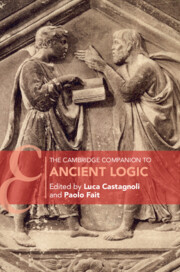Book contents
- The Cambridge Companion to Ancient Logic
- Other Volumes in the Series of Cambridge Companions
- The Cambridge Companion to Ancient Logic
- Copyright page
- Contents
- Contributors
- Introduction
- I The Development of Logic in Antiquity
- II Key Themes
- III The Legacy of Ancient Logic
- Bibliography
- Abbreviations
- Index of Passages
- General Index
- Other Volumes in the Series of Cambridge Companions
Introduction
Published online by Cambridge University Press: 29 April 2023
- The Cambridge Companion to Ancient Logic
- Other Volumes in the Series of Cambridge Companions
- The Cambridge Companion to Ancient Logic
- Copyright page
- Contents
- Contributors
- Introduction
- I The Development of Logic in Antiquity
- II Key Themes
- III The Legacy of Ancient Logic
- Bibliography
- Abbreviations
- Index of Passages
- General Index
- Other Volumes in the Series of Cambridge Companions
Summary
In late antiquity interpreters of Plato’s philosophy insisted that the whole of logic was already present in his dialogues. All kinds of syllogisms were used by Socrates and his interlocutors, and it was left to Aristotle and his successors only to name, classify and formalise them.1 This approach remained popular among interpreters until the first half of the twentieth century.2 More recent historians of logic have protested that in order to ‘discover’ or ‘invent’ logic it is not sufficient to reason according to certain valid patterns, or to represent someone acting in this way in a fictional dialogue. But there is a sense in which Plato did play a key role in the birth and development of ancient logic, a role which is often underplayed in histories of logic. In his dialogues Plato identified and explored a number of central philosophical issues to which logical concepts and methods offered powerful responses, if not definitive solutions. In this way, he was an essential catalyst for the birth of logic: if ancient logic was the promised land, Plato was its Moses. He never set foot in it, but enabled others to see the destination. Of course, when setting this agenda, Plato was not operating in a philosophical vacuum; often he was engaging in original ways with problems raised or foreshadowed by some of his predecessors and contemporaries (on the ‘prehistory’ of logic see Chapter 1 – Denyer).
- Type
- Chapter
- Information
- The Cambridge Companion to Ancient Logic , pp. 1 - 18Publisher: Cambridge University PressPrint publication year: 2023



